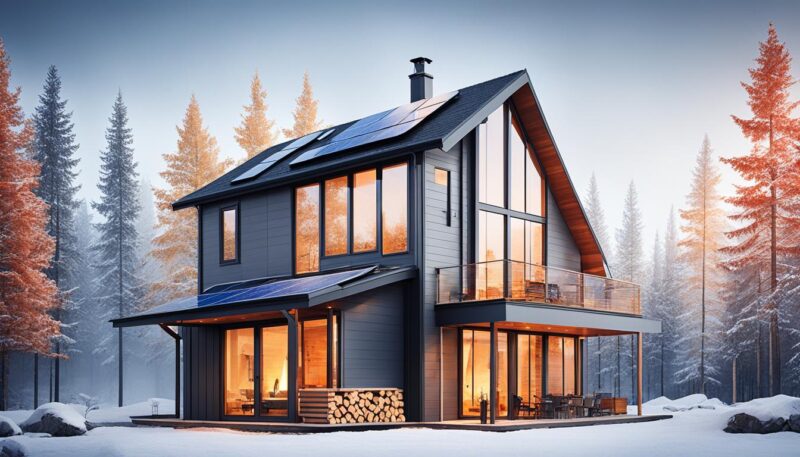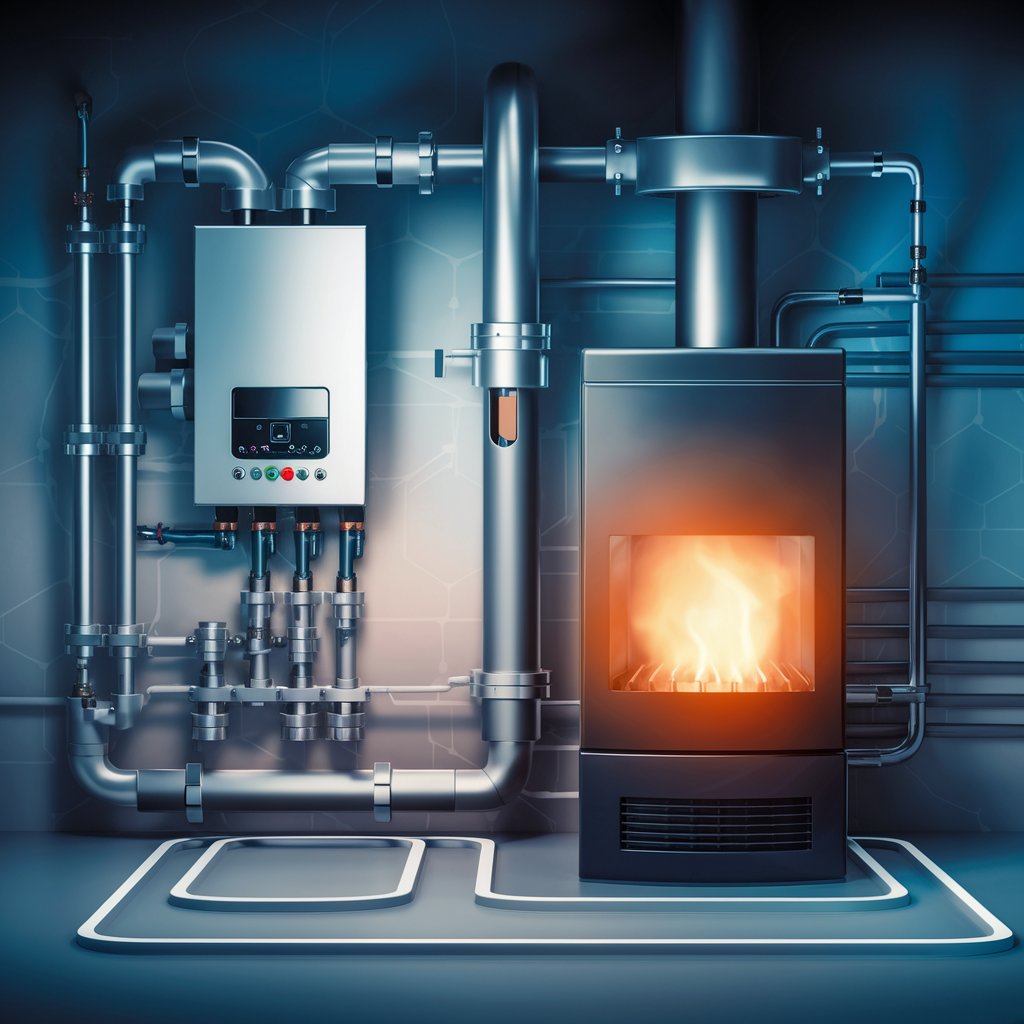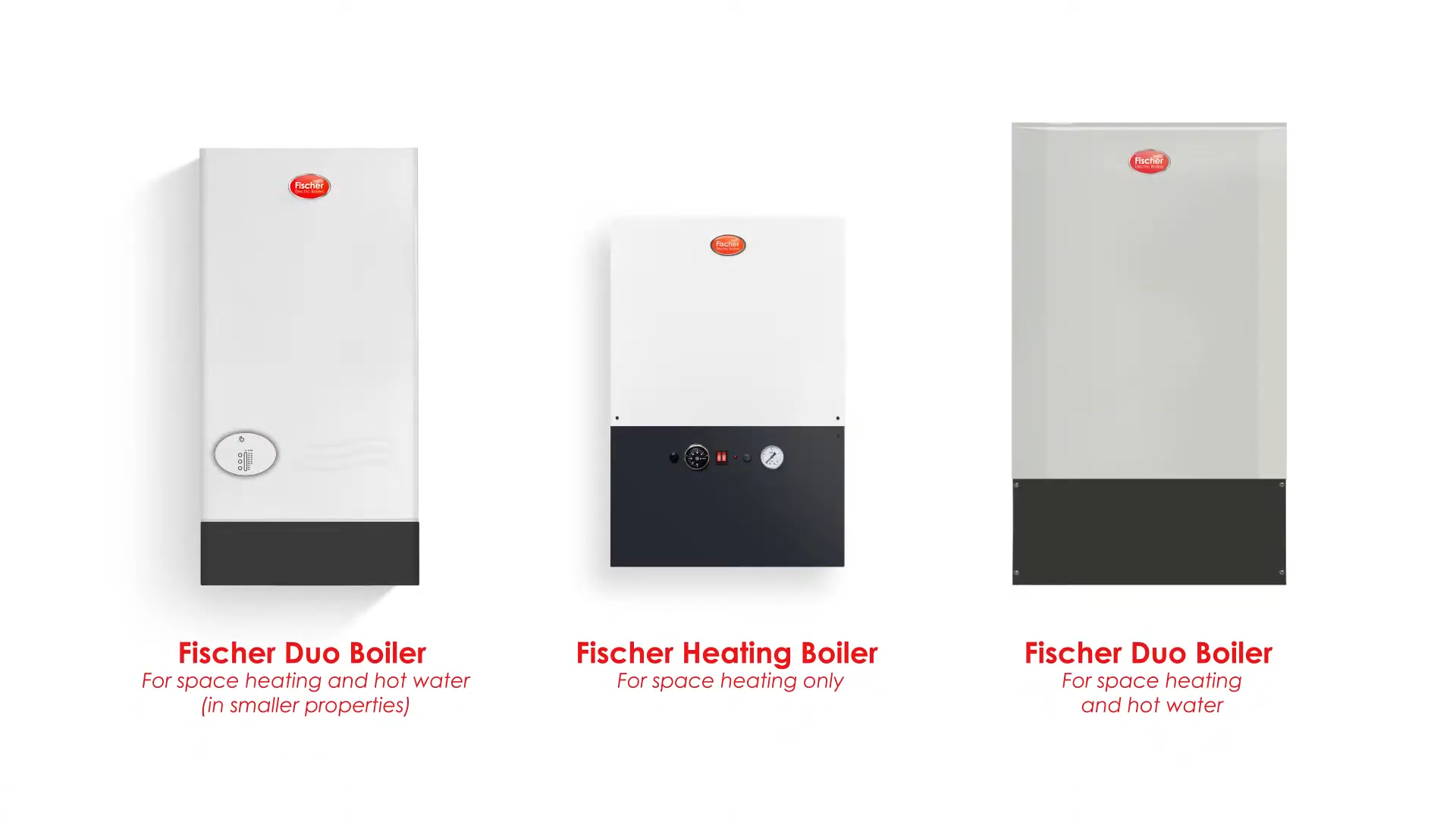
Did you know that heating a house can account for almost half of your annual energy expenses?
As energy costs continue to rise, finding cost-effective home heating options has become more important than ever. Whether you’re looking to save money or reduce your carbon footprint, there are affordable heating solutions available that can help you stay warm without breaking the bank. So, what’s the cheapest way to heat a house in 2024? Let’s explore some cost-effective alternatives to keep your home cozy and your wallet happy.
Key Takeaways:
- Heating a house can account for almost half of your annual energy expenses.
- Finding cost-effective home heating options has become more important than ever.
- There are affordable heating solutions available to keep your home cozy and your wallet happy.
- Consider factors such as energy availability and the specific heating needs of your home.
- Natural gas and electric heating systems can offer cost-effective options depending on location and efficiency.
Natural Gas Heating Systems

Natural gas heating systems, such as forced air furnaces and boilers, are considered cost-effective options for heating a house. These systems use natural gas as a fuel source to generate heat, which is then distributed throughout the house via ducts or pipes. Natural gas is often more affordable compared to other energy sources in the United States, making it a popular choice for many homeowners. Forced air furnaces are typically the least expensive option to install, while boilers for hot water or steam in radiators provide efficient heat distribution.
Forced air furnaces are commonly used in residential heating systems. They work by drawing in cold air from your home through a return duct, heating it in a heat exchanger, and then distributing the warm air through ducts and vents. These furnaces are affordable and offer quick and efficient heating for the entire house.
Boilers, on the other hand, use natural gas to heat water or produce steam, which is then circulated through radiators or underfloor pipes to provide warmth. The hot water or steam transfers heat to the surrounding space, making it a comfortable and energy-efficient heating method.
Here’s a comparison of forced air furnaces and boilers:
| Feature | Forced Air Furnaces | Boilers |
|---|---|---|
| Installation Cost | Low | Medium to High |
| Efficiency | Variable (depending on the model) | High |
| Heat Distribution | Via ducts and vents | Radiators or underfloor pipes |
| Heating Method | Air | Water or steam |
When considering natural gas heating systems, it’s essential to take into account the availability of natural gas in your area. While natural gas is widely accessible in many regions, there are still some areas where it may not be available. Consulting with a local heating professional can help determine the feasibility and affordability of natural gas heating in your home.
Electric Heating Systems
Electric heating systems offer several options for cost-effective heating in homes. These systems utilize electricity as the energy source to generate heat, providing efficient and reliable warmth. Whether you’re looking for the cheapest way to heat a house with electricity or seeking a specific type of electric heating system, there are various options to consider.
Electric Furnaces
Electric furnaces are a popular choice for affordable heating. They are often the least expensive to install among electric heating systems, making them a cost-effective option for homeowners on a tight budget. Electric furnaces work by passing air over heating elements, generating warm air that is then distributed throughout the house.
Boilers

Electric boilers are another option for heating a house with electricity. These systems heat water using electrical energy and distribute it through pipes to radiators or baseboard heaters, providing efficient heat distribution. Electric boilers are known for their cost-effectiveness and low maintenance requirements, making them an attractive choice for homeowners.
Heat Pumps
Heat pumps are highly cost-effective heating systems that can provide long-term energy savings. They work by transferring heat from the outside air to the indoor space, even in colder temperatures. Heat pumps utilize electricity to power the heat transfer process, making them an efficient and budget-friendly option for heating your home.
Radiant Floor Heat

Radiant floor heating is a luxurious and cost-effective way to heat a house using electricity. It involves installing electric wires or water-filled tubes underneath the flooring to radiate heat upward. This method provides consistent, efficient heat distribution, resulting in a comfortable living space while minimizing energy consumption.
Electric heating systems generally require less maintenance compared to other heating options, as they have fewer moving parts. This reduces the long-term cost of ownership and ensures hassle-free operation throughout the heating season. However, regular maintenance checks are still recommended to ensure optimal performance and energy efficiency.
When selecting an electric heating system, it’s essential to consider factors such as your budget, the size of your home, and your specific heating needs. Consulting with a professional HVAC technician can help you determine the most cost-effective and efficient option for your house. By investing in a reliable electric heating system and conducting regular maintenance, you can enjoy a warm and cozy home while keeping your energy costs under control.
Conclusion
When it comes to finding the best heating system for a tight budget, there are several money-saving alternatives to consider. Factors such as energy availability, current market rates, and the specific heating needs of your home play a crucial role in determining the most cost-effective option.
Natural gas heating systems can be an excellent choice for those looking to save money. Depending on your location and the efficiency of the system, natural gas heating systems offer affordability and reliable heat distribution. Electric heating systems, on the other hand, provide a range of options, including electric furnaces, boilers, heat pumps, and radiant floor heat. These systems can be cost-effective, especially when considering their lower maintenance requirements.
Supplementing your main heating system with space heaters is another money-saving alternative. Space heaters provide targeted heating for specific areas of your home without the need for a costly system upgrade. However, it’s vital to use them with caution and follow all safety guidelines to prevent accidents.
To further decrease your heating costs and reduce your carbon footprint, implementing energy-saving tips and adopting efficient heating practices is essential. This can include scheduling regular maintenance for your heating system, improving insulation and weatherization, using smart thermostats, and considering new energy-efficient heating options.
In the end, the best heating system for a tight budget will depend on your individual circumstances and preferences. Carefully evaluate your energy source options, research market rates, and consider the specific heating needs of your home. By taking these factors into account and exploring the various money-saving alternatives available, you can find a cost-effective heating solution that keeps your home warm and your wallet happy.

FAQ
What factors should I consider when looking for the cheapest way to heat my house?
When considering the cheapest way to heat your house, it’s important to take into account the energy source available in your area, current market conditions, and the specific heating needs of your home.
Are natural gas heating systems cost-effective options?
Yes, natural gas heating systems, including forced air furnaces and boilers, are generally considered to be more cost-effective than electric heating systems. However, the cost of natural gas versus electricity can vary depending on location and market rates.
What are the benefits of using electric heating systems?
Electric heating systems offer several cost-effective options for heating homes. Electric furnaces, boilers, heat pumps, and radiant floor heat are all viable choices. Electric heating systems generally require less maintenance due to having fewer moving parts.
Can supplementing my main heating system with space heaters help reduce costs?
Yes, using space heaters to supplement your main heating system can provide targeted heating in specific areas of your home without the need for a costly system upgrade.
What are some energy-saving tips for lowering heating costs?
To lower heating costs, consider scheduling regular maintenance for your furnace or boiler, installing smart thermostats, improving insulation and weatherization, bleeding radiators, changing air filters, installing heat recovery ventilators, and upgrading to a new energy-efficient heating system.
Which heating system is the best choice for a tight budget?
The best heating system for a tight budget will depend on factors such as location, energy availability, and the efficiency of the system. Natural gas heating systems and electric heating systems both offer cost-effective options, depending on these factors and your specific preferences.





